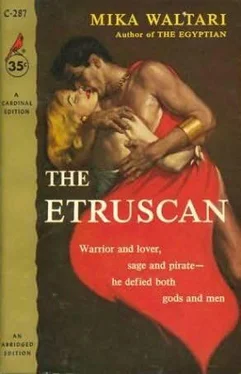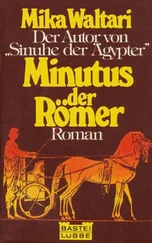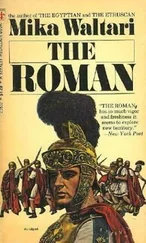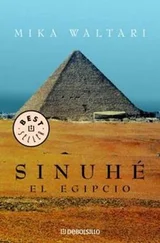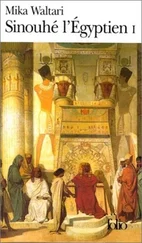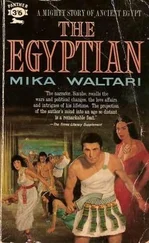Mika Waltari - The Etruscan
Здесь есть возможность читать онлайн «Mika Waltari - The Etruscan» весь текст электронной книги совершенно бесплатно (целиком полную версию без сокращений). В некоторых случаях можно слушать аудио, скачать через торрент в формате fb2 и присутствует краткое содержание. Жанр: Исторические приключения, на английском языке. Описание произведения, (предисловие) а так же отзывы посетителей доступны на портале библиотеки ЛибКат.
- Название:The Etruscan
- Автор:
- Жанр:
- Год:неизвестен
- ISBN:нет данных
- Рейтинг книги:4 / 5. Голосов: 1
-
Избранное:Добавить в избранное
- Отзывы:
-
Ваша оценка:
- 80
- 1
- 2
- 3
- 4
- 5
The Etruscan: краткое содержание, описание и аннотация
Предлагаем к чтению аннотацию, описание, краткое содержание или предисловие (зависит от того, что написал сам автор книги «The Etruscan»). Если вы не нашли необходимую информацию о книге — напишите в комментариях, мы постараемся отыскать её.
The Etruscan — читать онлайн бесплатно полную книгу (весь текст) целиком
Ниже представлен текст книги, разбитый по страницам. Система сохранения места последней прочитанной страницы, позволяет с удобством читать онлайн бесплатно книгу «The Etruscan», без необходимости каждый раз заново искать на чём Вы остановились. Поставьте закладку, и сможете в любой момент перейти на страницу, на которой закончили чтение.
Интервал:
Закладка:
Miletus sent out target vessels filled with logs and twigs that kept them afloat despite the gashes in their sides. But many commanders refused to attack the targets, fearing that their bronze rams would be twisted, their oars would snap and the galleys would burst at the seams.
Dionysius however declared, “We must test the strength of our vessels and rams as well as our ability to disengage ourselves quickly once we have struck.”
With the first crash I toppled off the bench, struck my head and almost lost my oar. From the deck I heard the sound of clanking from prow to stern as though a slave had dropped an armful of bronze dishes onto a paved street. But it proved to be only Dorieus who had lost his balance when we rammed the target.
When he had had evidence of my good will Dionysius released me and, because I could read and write, took me with him on deck. He taught me how to recognize the various signals and trumpet calls that were used to direct the unified movements of the galleys. Upon receiving wax tablets from the city and the fleet’s council, he had me read them aloud and write replies. Previously he had tossed them overboard. After I had shown him how, he wrote a short message and as a result received, to his great surprise, a sacrificial bull, three sheep and a boatload of fruit and root vegetables. I explained that Phocaea was obligated to contribute the same amount of provisions to the allied depot at Miletus, where there were also available flute players, oil, wine, and copper plaques decorated with lion heads to be worn as badges of rank by the helmsmen.
“This is unbelievable,” muttered Dionysius. “Although I wept, cursed and stamped my foot at the depot, I wasn’t given even a sack of flour for my ships. Whereas you make me rich by merely drawing letters in wax. Perhaps this war isn’t as bad as I had thought.”
The entire fleet had begun to suspect that the war had turned for the worse. Only the authority of Miletus kept the fleet intact, for the world’s richest city, mother of a hundred colonies, could not be permitted to fall.
Then came a night when the sky over the city turned red and word spread that the Persians had robbed the Ionian temple of Apollo and set it on fire as a signal to their fleet. As I watched the glow I suddenly knew that the Persians were avenging the burning of the temple of Cybele at Sardis. It was fortunate for me that I was at the Phocaean camp, for had I remained in Miletus and been recognized I would surely had been killed by the enraged populace.
Fear and confusion gripped Lade, but during the night the men grew calmer. Many felt that the Persians had brought a curse upon themselves by destroying the oracle, others again were certain that nothing could save lonia since the god had been unable to protect even his own temple. But all the men purified themselves, braided their hair, anointed their faces and donned their best garments in preparation for battle.
3.
When the sky lightened, a thick column of smoke was still rising from the city as a signal to the hundreds of Persian galleys which had rowed out to sea to engage us in battle. To the sound of trumpet and conch we rowed out to meet them in the battle formation determined by the council, the larger vessels in the center and the lighter on either side. The golden city of Miletus fell behind us. Progress was slow, for many oars snapped and the ships got in one another’s way. The closer we came to the Persians the closer the vessels hugged one another for mutual protection.
We saw the silver and bronze glimmer of the Phoenician ships with the frightening figures of their deities. But we also saw Greek ships from Cyprus as well as other Ionian galleys in the enemy’s formation. Ionian prisoners were sacrificed on the Phoenician vessels and their blood was spilled into the water under the prows.
The sea was rilled with Persian ships. But the allied fleet likewise covered the sea. Mallets began beating out a quickened rhythm on the brass gongs, the song of the oarsmen became frenzied. The water churned under the prows as the two rows of vessels sped toward each other. My throat was dry, my stomach tense with fear. Then I knew only the roar and the crash, the utter confusion, the splash of water and the screams of the dying.
We were fortunate in the first attack. Our ship under Dionysius’ command rowed at an angle towards the enemy’s galleys as though deliberately presenting their sides, then suddenly turned and rammed into the nearest vessel. It tilted over us, its men falling into the water and onto our deck. Arrows whistled through the air. Alternately rowing and backing water, we strove to free ourselves of the sinking ship. But as we pulled loose our stern crashed into another galley and men swarmed aboard. Our deck groaned under the weight of combat.
All five of our ships were tangled in a helpless knot among the enemy galleys. Our rowers ran to the decks with their weapons but many of them fell before the Persians’ arrows. In the confusion I found myself beside Dorieus on the deck of a Phoenician vessel, and before I even knew how it had happened we had taken the galley, flung the deity on its prow into the sea, and forced into the water all those who dared not fight and fall on the blood-stained deck.
But because of the meagerness of our forces we were compelled to abandon the ship and leave it drifting with broken oars. When the tumult had stilled and Dionysius had summoned his ships, all five responded and we saw that we had broken the enemy’s front. With the collective strength of our five galleys we surged toward the center where the magnificent vessels of Miletus were engaging the enemy.
By midday our penteconter was sinking beneath us and to save ourselves we were obliged to capture a Phoenician bireme. When Dionysius had raised his emblem he began to look around.
“What does that mean?” he demanded.
We saw sinking and drifting ships, swimmers and floating bodies, and men clutching oars and fragments of wood. Beyond them the Ionian fleet, which had remained behind to protect the strait of Lade, was rowing full speed towards our rear and before we realized what was happening it was attacking the vessels of its allies.
“They waited to see which side would be victorious,” said Dionysius bitterly. “With this deed they are bargaining for clemency for their cities. The goddess of victory has abandoned lonia.”
Nevertheless we continued to fight and lost two vessels in the unequal battle. We did, however, manage to rescue the survivors so that the three remaining galleys were fully manned. Dionysius ordered the Phoenician oar-slaves, whom he did not trust, to jump into the sea, then disengaged himself from the battle and turned his vessels towards the open waters. Many Ionian ships were fleeing northward, pursued by the relentless Persians. The Ionian oarsmen now had need of the strength that they had gathered while lying under their sails for weeks.
As one of the participants I should have more to tell about the sea battle at Lade. But I was inexperienced in naval warfare and my eye could not easily distinguish one vessel from another. Most indicative of my inexperience is the fact that I was amazed to see the heaps of treasure chests, expensive weapons, sacrificial vases and urns and gold jewelry on our ships. While I had been fighting for my life, Dionysius and his men had had time to rescue the treasure in the vessels they had captured, and hastily to cut off arms and thumbs that yielded bracelets and rings.
Dionysius was pleased with the Phoenician galley that he had seized. He rapped its cedar planks, inspected its accommodations and the placement of its rowers’ benches, and cried, “What a ship! If I had a hundred like it and each manned by Phocaeans, I could conquer every sea.”
Читать дальшеИнтервал:
Закладка:
Похожие книги на «The Etruscan»
Представляем Вашему вниманию похожие книги на «The Etruscan» списком для выбора. Мы отобрали схожую по названию и смыслу литературу в надежде предоставить читателям больше вариантов отыскать новые, интересные, ещё непрочитанные произведения.
Обсуждение, отзывы о книге «The Etruscan» и просто собственные мнения читателей. Оставьте ваши комментарии, напишите, что Вы думаете о произведении, его смысле или главных героях. Укажите что конкретно понравилось, а что нет, и почему Вы так считаете.
